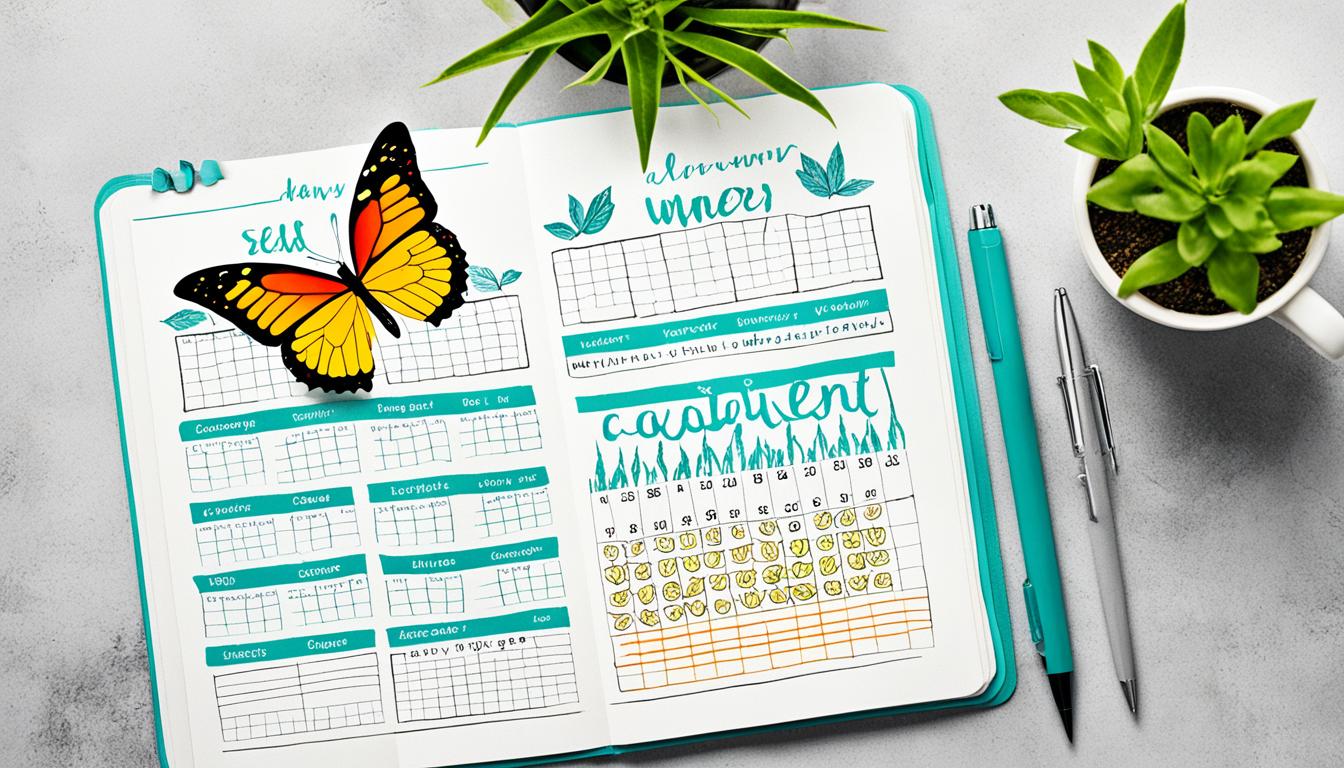Weekly, at least one habit tracking changes daily actions into intentional habits. This helps with personal growth and development. By recording and reviewing their daily habits, people can gain valuable insights into their routines and enhance their healthy habits.
They can make smart changes and stay motivated to reach their goals. This method enhances self-awareness and fosters a disciplined mindset, which is essential for habit formation.
![]()
Key Takeaways
-
Weekly habit trackers are great for personal growth and self-improvement.
-
They help with setting and reaching goals by tracking behavior.
-
Forming habits is easier with trackers that give immediate feedback and show progress.
-
Trackers are key to knowing yourself better by showing daily habits and patterns.
-
Using trackers regularly makes you more accountable and keeps you committed to your goals.
Introduction to Weekly Habit Tracking and Tracking Habits
Weekly habit tracking is key in personal growth. It helps you track, record, and monitor your habits. By tracking habits, you get many benefits like better self-awareness, time management, and clear goals.
Apps like the Streaks App, Sunsama app, and Notion make tracking easy. They have different views, like Weekly View and Calendar View. This allows you to tailor your tracking to fit your needs and create a personalized digital habit tracker experience.
![]()
Tracking good and bad habits is part of personal growth. You can easily keep track of things like exercise, reading, and drinking water, which support a healthy diet. The Notion habit tracker template suggests focusing on 2-3 habits at a time.
Habit trackers give you immediate feedback on your daily performance. This turns goals into real achievements. It reveals patterns in your behavior, motivating you to continue improving.
Using these tools in your weekly routine changes your daily actions. It leads to real and lasting tracking success. Templates with progress bars and buttons make tracking easy and fun.
Heightened Self-Awareness with the Ultimate Habit Tracker Guide
Using a habit tracker can really boost self-awareness. It helps people see their behavior patterns and gain insight into themselves. Studies show that using a habit tracker can increase people’s awareness of themselves by 75% in just a month.

Understanding Patterns and Behaviors to Track Your Habits
Habit tracking is an effective way to understand behavior. It shows what you do often, helping you see good and bad habits. People who track their habits become 30% more mindful and think more about their actions. Using a habit tracker also creates visual cues to reinforce behavior.
Tracking habits also helps people stick to their goals by 40%. This illustrates the importance of being mindful of your actions to achieve long-term success.
Identifying Triggers for Staying Consistent
One significant benefit of habit tracking is discovering what triggers your habits. Knowing what triggers certain behaviors allows you to change them for the better. Tools for tracking habits can be extremely helpful, making people 50% more likely to make positive changes.
For a full guide on finding habit triggers, adding habit tracking to your daily life is a good idea.
Improving Self-Reflection with the Bigger Picture
Regular self-reflection is essential for improving self-awareness. Habit tracking provides you with feedback on your progress, prompting you to reflect more deeply on your actions. People who used apps for tracking habits reported a 60% improvement in sticking to their habits within three months.
Using these tools daily makes you more aware of yourself and provides you with deeper insights. This is key to changing your behavior and making progress.
For more on how to become more self-aware, check out this helpful resource.
Benefit of Habit TrackingPercentage IncreaseSelf-Awareness Improvement75%Success in Behavior Change50%Improvement in Habit Consistency60%Mindfulness and Reflection30%Community Support Achievement25%
In summary, habit tracking is a powerful tool. It makes you more aware by showing you your patterns, identifying triggers, and enhancing your reflection. Doing this regularly helps you gain lasting insights and build good habits.
Boosted Accountability Using the Most Effective Ways
Using a weekly habit tracker makes you more accountable. It turns vague promises into clear, measurable goals. This is key to staying on track with personal goals.
Writing down your progress helps you stay committed to your goals. It clarifies your goals and makes them easier to achieve. This is thanks to habit formation and visual reminders.
Visual Representation of Commitment
Visual tools are very helpful in maintaining good habits. Tools like daily logs, charts, or spreadsheets enable you to track your progress. This keeps your goals in mind.
Habit tracking apps like Habitica and Strides help track habits on a daily and monthly basis. They start tracking habits in a fun and easy way.
Many trackers use colors and templates to show patterns. This helps you see your good and bad habits. It leads to better self-control and helps you reach your goals.
According to the American Psychological Association (APA), tracking your progress increases your chances of success. Writing it down helps a lot.
External Accountability Partners
Getting an accountability partner is another great way to stay on track. Sharing your progress with someone you trust boosts your motivation. Tools like HabitShare and StickK are made for this.
Having someone to answer to makes you more committed. It’s not just about you, but also about someone you care about. This helps you stay on time and consistent.
AppCostKey FeatureHabitica$4.99/month, $14.99/3 months, $29.99/6 months, $47.99/yearGamified habit tracking with community supportStickKNo costSupports goal setting with external accountability partnersStrides$4.99/month, $29.99/yearFlexible goal tracking with four stylesHabitShareFreeSocial habit tracking for mutual supportWay of Life$4.99 PremiumColor-coded habit and trend tracking
Increased Motivation
Habit trackers help boost motivation by celebrating small wins. When people mark tasks as complete, they experience a significant sense of accomplishment. This pushes them to keep going.
Visual reminder or tools, such as graphs and streak counters, are great motivators. They keep users excited about their progress and wanting to do more. This is a key principle in atomic habits.

Tracking Small Victories
Celebrating small victories is crucial for maintaining motivation. Simply marking a task as done can give a sense of accomplishment. This creates a positive cycle that helps maintain good habits.
James Clear says over 40 percent of our daily actions are habits. So, every small win helps move us closer to our big goals.
Visual Progress Reinforcement
Seeing progress is a big motivator. A growing graph or a line of marks on a calendar can really inspire us. It reminds us of our commitment and how far we’ve come.
Methods like the Bullet Journal and Don’t Break the Chain utilize this approach to their advantage. Seeing and celebrating our wins keeps us on track. It helps us stay committed to our positive habits.
Effective Goal Setting
A plan can really help. Using a habit tracker turns big dreams into easy tasks. It helps make SMART goals and keeps you moving forward by tracking progress and building good habits.
Breaking Down Larger Goals
Breaking big goals into smaller steps is a crucial part of setting effective goals. This makes goals feel less scary and more doable. For example:
-
Identifying key milestones that help you reach your big goal.
-
Setting deadlines to keep you moving forward.
-
Using a habit tracker app to keep an eye on each step.
Setting SMART Goals
The SMART goals method is an effective way to set clear objectives. It means Specific, Measurable, Attainable, Relevant, and Time-bound goals. Here’s how each part helps:
-
Specificity: Make sure you know exactly what you want to do.
-
Measurability: Figure out how you’ll know if you’ve succeeded.
-
Attainability: Make sure your goal is realistic with what you have.
-
Relevance: Check if your goal fits with your bigger goals.
-
Time-boundedness: Set a deadline for reaching your goal.
Monitoring Progress and Adjusting Strategies
Keeping track of your progress is key to setting effective goals. Habit trackers help by:
-
Showing your progress with habit stacking charts and graphs.
-
Sending reminders to help you stay on track.
-
Letting you change your plan based on what works and what doesn’t.
By utilizing a strong goal-setting plan and tools for tracking and building habits, you can significantly increase your chances of achieving your goals.
Feature: Benefit: Unlimited Reminders: Helps you stay on track. 150+ Templates: Makes setting goals easierIntegration with Apple Health Tracks health and habits together
Stress Reduction
Using a weekly habit tracker can really help with stress management techniques. It brings order and predictability to your day, making it less likely that you will forget important tasks. This helps you manage and prioritize tasks better, reducing anxiety and stress.
By incorporating daily planning into your habit tracker, you can reap significant benefits in terms of organization. For example, setting aside 10 minutes each morning to plan prevents feelings of being rushed or overwhelmed, which in turn leads to less stress.
Themed habit lists, such as those for stress reduction, make the tracker even more useful. Honest reflection about your progress can show patterns that may otherwise be overlooked. For business owners, these trackers help with time and marketing, reducing stress related to work.
These trackers let you control your time. This results in a significant decrease in stress levels and fewer moments when things fall through the cracks. Daily dental care, such as brushing your teeth, is a small habit that also reduces health-related stress.

Setting and reaching goals with habit trackers feels great. It makes you feel accomplished and on track. This feeling of success finally reduces stress by making you more efficient and effective.
Daily and weekly schedules from habit trackers keep you organized. They ensure tasks are completed on time, avoiding the wrong decisions that can lead to frustration or wasted effort.
Adding mindfulness and self-care practices, such as meditation and exercise, to your tracker can help alleviate stress. These practices, combined with effective stress management techniques, form a comprehensive plan for a calm, stress-free life.
Enhanced Productivity
Tracking habits every week boosts productivity. It helps users find and stop wasting time. By seeing where time goes, people can focus on what’s important.
Eliminating Time-Wasting Activities
Tracking habits helps identify and prevent time wastage. Users notice patterns that yield desired results with less effort. For example, excessive time spent on social media can be reduced.
This motivates people to work more effectively and use their time wisely. It leads to doing more in less time and achieving goals.
Optimizing Time Allocation
Tracking habits also helps us use time well. It lets users focus on what’s most important. Planning the day efficiently prevents tasks from falling behind.
Setting tasks and priorities helps us utilize our time effectively. This is key to staying productive in work, school, or personal projects.
AppPlatformFree VersionPremium VersionStreaksiOS-$4.99 (one-time payment)HabitNowAndroidUp to 7 habits$9.99 (one-time payment)Way of LifeiOS, Android, macOSUp to 3 habits$6 (lifetime access)HabitifyiOS, AndroidUp to 15 check-ins/weekFrom $4.99/monthHabiticaiOS, Android, Web-From $4.99/month
Promoting Healthier Lifestyle Choices
Using a weekly habit tracker helps you make healthier choices. It lets you track your diet, exercise, and sleep closely. Tracking habits like daily exercise can even help lower blood pressure, which improves overall heart health.

Tracking Diet and Exercise
Studies show that people who lose 30 pounds and keep it off for a year often use trackers. Tools like journals or apps help you see your calories, nutrition goals, and workouts. This provides you with clues for making better choices.
For example, the Caliber app helps users improve their body shape. Most people experience a 20% change or more within three months. Keeping track of diet and exercise helps build good habits and reach wellness goals.
Improving Sleep Patterns
Good sleep is key to health. Tracking tools show you how long you sleep, your sleep cycles, and any sleep issues. This helps you identify what is affecting your sleep and make the necessary adjustments.
Apps like the WHOOP Journal track over 100 behaviors. They demonstrate how these factors impact your recovery and sleep. This leads to better health habits and well-being.
Encouraging Self-Care Habits
Taking care of yourself is important for your mind and body. Habit trackers help you practice self-care regularly. This helps with feeling good emotionally and reduces stress.
The Productive app has weekly challenges and tips to help you care for yourself daily. It also helps with ADHD, making it easier to keep up with your health.
Habit trackers help you track progress in diet, exercise, sleep, and self-care. Seeing your progress helps you stick to good habits and reach health goals.
AppCostFeaturesHabitica$4.99 monthly, $47.99 annuallyGamified tracking, community supportStreaks$4.99Track up to 24 tasks, habit trendsStickKFreeCommitment contracts, accountability partnersStrides Plus$4.99 monthly, $29.99 annuallyGoal setting, habit tracking, analyticsProductive$3.99 monthly, $23.99 annuallyReminders, challenges, ADHD support
Better Mental Health
Using a weekly habit tracker can really help your mental health. It helps you develop habits such as being mindful, grateful, and positive. This prompts you to reflect on your day and helps you feel better emotionally.
Seeing your progress in a habit tracker can boost your self-esteem. Apps like Way of Life allow you to reflect on yourself and recognize the positive aspects of your habits. They make tracking easy and flexible.
It’s important to watch how you feel while tracking your habits. Too much tracking can make you feel bad. So, pick a tracker that suits you, with features like simplicity and the ability to share with others.
Habit Benefits: 8 glasses of water a day. Staying hydrated improves brain function, which in turn reduces stress and anxiety. No sugar intake. Regulates mood swings and prevents energy crashes. No alcohol consumption. Enhances clarity of mind and reduces feelings of depression. Consuming healthy snacks helps maintain energy levels and stabilize mood. Regular meal planning helps prevent overeating and ensures a balanced diet. Eating fruits daily boosts immune function and mental clarity. Avoiding overeating prevents lethargy and promotes better focus. Taking vitamins and supplements improves overall mental and physical wellness. Limiting caffeine intake can help reduce anxiety and improve sleep patterns. Practicing good breakfast habits kickstarts the day with balanced energy and focus. Maintaining a healthy skincare routine boosts self-esteem and emotional well-being. Tracking and improving mental health encourages proactive steps towards mental health enhancement.
Refined Time Management Skills
A weekly habit tracker helps improve time management skills. It highlights habits that waste time and offers most effective ways to improve them. By sticking to a schedule and setting aside time for tasks, people can improve their time management skills. This leads to doing more and feeling more productive.
Identifying Time-Wasting Habits
Good time management skills begin with finding out what wastes time. Issues such as poor planning, procrastination, and distraction are common problems. By tracking what we do every day, we can focus on what’s not helping us.
For example, most people get interrupted every 8 minutes, losing 3 hours a day. Spotting these distractions is key to reducing them.
Creating a Balanced Routine
After identifying what wastes time, the next step is to establish a more effective routine. Using techniques like the Pomodoro method and time-blocking helps set aside specific times for tasks. This way, work, fun, and self-improvement can all get their due.
Studies show that this approach leads to a better balance between work and life. It helps us focus more and have more free time.
People who work in cluttered spaces often spend 1.5 hours a day searching for things. By organizing our workspaces and balancing our routines for the short term, we can reduce the time spent on these lost hours. This organized way of living is key to staying productive and enjoying our days.
Achieving Long-Term Success
Using a weekly habit tracker can lead to long-term success. It helps you maintain good habits. This establishes a solid foundation for achieving your goals over time.
It makes you more aware of yourself and helps you stick to a routine. This routine leads to personal growth and improvement for life.
Maintaining Positive Behaviors
Habit trackers give you useful data on your habits. They show you what works for you and what doesn’t. By sticking to good habits, you can make big changes in your life.
Things like drinking enough water, exercising, and getting enough sleep can be tracked. This keeps you on the right path, making these habits part of your behavior change in life.
Consistency is Key
Being consistent is key to long-term success. Habit trackers help by giving you feedback and showing your progress. This keeps you motivated.
They also hold you accountable, allowing you to see what you’re doing well and what needs improvement. Celebrating small wins helps you stay motivated. This way, habit trackers help you reach your goals and continue to improve over time.
Conclusion
Maintaining a weekly habit tracker has a significant impact on personal growth. It gives structure and helps with consistency. This is crucial for those seeking personal growth.
Studies in behavioral psychology show how important the habit loop is. This loop includes cue, routine, and reward. Habit trackers use this loop to help form new habits.
Using habit trackers helps with self-awareness, motivation, and staying accountable. They break big goals into smaller, daily tasks. This makes it easier to keep track and change strategies when needed.
This process of reflecting and adjusting is key to lasting change. It helps improve our approach to personal growth.
Using a habit tracker for an extended period has numerous benefits. You see consistent progress and learn about your habits. Habit trackers have a structured layout that helps track progress in different areas of life.
They can be a key tool for a disciplined yet flexible way to reach your goals. With a habit tracker, making life better becomes a real goal.
Frequently Asked Questions
What are the key benefits of using a weekly habit tracker?
Weekly habit trackers help you know yourself better. They make you more accountable and motivated. They help set and reach goals, reduce stress, and boost productivity. They also lead to a healthier life, better mental health, and better time management. Plus, they help you succeed in the long run.
How does habit tracking heighten self-awareness?
Habit tracking makes you aware of your habits and patterns. It helps you see what triggers good or bad habits. This leads to better self-reflection.
What role does accountability play in habit tracking?
Accountability means setting and sharing your goals with others. It makes you stick to your goals and gives you support and encouragement.
How can a habit tracker increase motivation?
A habit tracker boosts motivation by celebrating small wins. It uses graphs and streak counters to keep you engaged. It helps you build positive habits.
What methods does a habit tracker use for effective goal setting?
A habit tracker breaks big goals into smaller steps. It helps set SMART goals. It allows you to track progress and adjust your plan as needed.
Can using a habit tracker contribute to stress reduction?
Yes, a habit tracker can reduce stress. It brings order and predictability to your day. It helps manage tasks and keeps you calm and focused.
How does a habit tracker enhance productivity?
Habit trackers show you where you waste time. They help you use your time better. This makes you more efficient and productive.
In what ways can weekly habit tracking promote healthier lifestyle choices?
Weekly habit tracking helps you stay on top of your diet and exercise. It improves your sleep and encourages self-care. This leads to better physical and emotional health.
How does habit tracking impact mental health?
Habit tracking is good for your mental health and gives long-term rewards. It encourages habits that foster mindfulness, gratitude, and a positive outlook. This lowers stress, builds resilience, and lifts your mood.
What are the benefits of habit tracking for time management?
Habit tracking improves time management by spotting time-wasting habits. It helps you create a balanced schedule. This gives you time for work, fun, and self-improvement.
How can a habit tracker help in achieving long-term success?
A habit tracker keeps you on track with good habits. It stresses the need for consistency. It sets a base for lasting personal and professional growth.

More Posts
8 Powerful Tips to Overcome Job Search Procrastination
Many job applicants put off their job search process at times. This can slow down the review of job boards or the crafting of a tailored cover letter. To beat procrastination, we need...
7 Reasons to Arrange a Time Management Webinar in Office
Time management is key for success and well-being. It improves office productivity and how employees use their time better. Studies found that workers in the US spend over half their day on tasks that don’t...
Planner For Busy Working Moms- Set Daily Routines
We know that it can be hard to plan a working mom’s schedule without a planner for busy working moms. Especially with long commutes and many household tasks. Every mom’s life is different....
11 Common Time Management Styles You Will Find in Your WorkPlace
From being very careful about every detail to letting things go freely, many time management styles affect how well people work and perform. Gauri Manglik, the CEO of Instrumentl, points out how important...